Introduction
It's August 18, 2006 and I have just got back home from
a guide trip on Old Hickory Lake here in middle Tennessee.
After a short nap I decided to finally sit down and begin to
write this Tips Article that's been on my mind. It is
now 3:45pm, I'm looking out the bay window in our dinning
room at a thermometer that's reading 97 degrees in the
shade. This is a very typical day here in middle Tennessee
lately. It can be summed up in one descriptive word "Hot".
It's just been plain "Old Hot" here for weeks
on end. I'm not sure that we have had a summer that has
been this hot Without Wind! Most days there has been very little
if any wind blowing during the morning and mid day hours. The
heat kicks up a thunderstorm every so often late in the day,
but for the majority of the time it's just hot and still. "BUT" there
is change coming right around the corner!
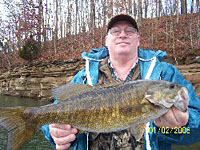 It won’t be long before the 97 degrees will be replaced
with much cooler air temperatures. Shorts and short sleeve
shirts will be replaced with Body Amour and Gore-Tex suits.
Iced down spring water will be replaced with a thermos of hot
coffee. Sun block will be replaced with hand warmers. A quick
ride in the boat to cool off will be replaced with a Coleman
heater to help stay warm. Yes, change is just around the corner.
It won’t be long before the 97 degrees will be replaced
with much cooler air temperatures. Shorts and short sleeve
shirts will be replaced with Body Amour and Gore-Tex suits.
Iced down spring water will be replaced with a thermos of hot
coffee. Sun block will be replaced with hand warmers. A quick
ride in the boat to cool off will be replaced with a Coleman
heater to help stay warm. Yes, change is just around the corner.
I can only speak for myself, but I can truthfully say "Man
I'm Ready". I'm ready for the Corp of Engineers
to drop our water levels to winter pool. I'm ready to
kick my trucks 4 wheel drive in to get up and down the boat
ramp. I'm ready for the extended points, humps and bars
that have been invisible all summer to rise up above water
level. I'm ready to be able to see my breath when I walk
outside. I'm ready to look at my clients and say "Nippy
isn't it". I'm ready to hear my lovely wife
say "You're crazy for fishing in weather like this".
Yes, change is just around the corner!
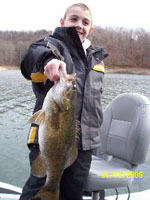 Not only is there weather and water change around the corner
but there is also a focus change for me as well. My focus changes
in the winter from primarily fishing for Largemouth on Old
Hickory Lake to fishing for those (as legend Billy Westmorland
said) "Ole Brown Fish" on Tim's Ford Reservoir
near Tullahoma Tennessee. To me there's nothing better
than chasing winter Smallmouth here in Tennessee. And we have
an abundance of lakes and river systems to chase them in.
Not only is there weather and water change around the corner
but there is also a focus change for me as well. My focus changes
in the winter from primarily fishing for Largemouth on Old
Hickory Lake to fishing for those (as legend Billy Westmorland
said) "Ole Brown Fish" on Tim's Ford Reservoir
near Tullahoma Tennessee. To me there's nothing better
than chasing winter Smallmouth here in Tennessee. And we have
an abundance of lakes and river systems to chase them in.
For the beginner these changes can become somewhat of a challenge
and propose several questions like. (1) How do you adjust to
a 45 degree water temperature swing? (2) How you adjust when
much of the structure that you have been fishing all summer
long is now on dry ground? (3) What kind of adjustments do
you make in your tackle? (4) Do you make adjustments in your
presentation? You know the list of questions can go on and
on. Hopefully I can shed some light on this for those of you
that are new to winter fishing. I certainly don't have
all the answers. I'm learning more every year myself.
And I know that there are many ways to catch winter fish, but
I just want to share some of what works for me. As I always
say, "Take what you can use and throw away the rest."
So fasten your seat belts, open your mind and here we go!
Why Switch Lakes?
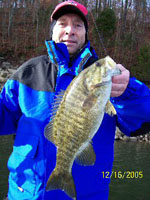 Before I go any further I need to address why I switch from
Old Hickory to Tim's Ford during the winter months. Old
Hickory is a river lake that is known primarily for a solid
Largemouth Bass population. Old Hickory (22,500 acres) most
certainly has a Smallmouth population but acre for acre the
density of Smallmouth vs. Largemouth is less. On the other
hand, Tim's Ford is already famed Dale Hollows closest
middle Tennessee rival. Tim's may never match Dale Hollows
reputation for quality but take it from this full time guide,
Tim's Ford is a blue ribbon Smallmouth lake already.
My personal best Tim's Smallmouth last winter was 6 pound
2 ounces, a trophy just about any where. The pictures that
are scattered through this article are just some of the Tim's
Ford fish caught during
Before I go any further I need to address why I switch from
Old Hickory to Tim's Ford during the winter months. Old
Hickory is a river lake that is known primarily for a solid
Largemouth Bass population. Old Hickory (22,500 acres) most
certainly has a Smallmouth population but acre for acre the
density of Smallmouth vs. Largemouth is less. On the other
hand, Tim's Ford is already famed Dale Hollows closest
middle Tennessee rival. Tim's may never match Dale Hollows
reputation for quality but take it from this full time guide,
Tim's Ford is a blue ribbon Smallmouth lake already.
My personal best Tim's Smallmouth last winter was 6 pound
2 ounces, a trophy just about any where. The pictures that
are scattered through this article are just some of the Tim's
Ford fish caught during 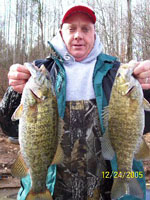 the winter season. See what I mean?
Also in 2005 the TWRA established an 18 inch size limit on
Tim's Ford Smallmouth which can only help to increase
the quality every year. Mile for mile lake structure on Tim's
is (at least for me) more conducive to Smallmouth. There is
an almost unlimited amount of deep water private boat docks,
public and private ramps, rock points, shallow sloping gravel
rounds, ledges, mud banks, long winding creeks and coves, islands,
shallow water/deep water access areas and quick drop off's,
major river channel points. Many of Tim's creeks are
loaded with stumps and lay down timber protruding out into
deep water. Although Tim's is only 10,500 acres it fishes
much larger and has an abundance of shad and crawfish for Smallmouth
to feast on. Another factor is, in the winter months you don't
have to depend as much on generation schedules on Tim's
as you do Old Hickory. Let me also say that Tim's has
a great Largemouth and Walleye population as well, which is
always an added bonus. Spotted bass also roam Tim's clear
waters but on the average are smaller. If a fisherman is looking
for a chance at a bragging size Spot, Center Hill near Smithville
Tennessee is the answer. There are so many reasons why I fish
Tim's and one reason I don't want to forget is "Tim's
is easy on the eyes". What a beautiful lake, it's
not hard to get caught up in all the scenery around you. Plus
it's just plain fun to fish Tim's! Moving on!
the winter season. See what I mean?
Also in 2005 the TWRA established an 18 inch size limit on
Tim's Ford Smallmouth which can only help to increase
the quality every year. Mile for mile lake structure on Tim's
is (at least for me) more conducive to Smallmouth. There is
an almost unlimited amount of deep water private boat docks,
public and private ramps, rock points, shallow sloping gravel
rounds, ledges, mud banks, long winding creeks and coves, islands,
shallow water/deep water access areas and quick drop off's,
major river channel points. Many of Tim's creeks are
loaded with stumps and lay down timber protruding out into
deep water. Although Tim's is only 10,500 acres it fishes
much larger and has an abundance of shad and crawfish for Smallmouth
to feast on. Another factor is, in the winter months you don't
have to depend as much on generation schedules on Tim's
as you do Old Hickory. Let me also say that Tim's has
a great Largemouth and Walleye population as well, which is
always an added bonus. Spotted bass also roam Tim's clear
waters but on the average are smaller. If a fisherman is looking
for a chance at a bragging size Spot, Center Hill near Smithville
Tennessee is the answer. There are so many reasons why I fish
Tim's and one reason I don't want to forget is "Tim's
is easy on the eyes". What a beautiful lake, it's
not hard to get caught up in all the scenery around you. Plus
it's just plain fun to fish Tim's! Moving on!
Answers To Some Puzzling Questions
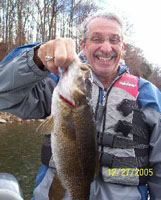 In this section I’m going to try to answer some of the
questions for the beginner that I proposed above. Please keep
in mind this is what works for me on Tim's Ford a deep
moderately clear lake. Others may approach these questions
from a different angle. There's always more than one
way to skin a cat, or in this case catch a Smallmouth!
In this section I’m going to try to answer some of the
questions for the beginner that I proposed above. Please keep
in mind this is what works for me on Tim's Ford a deep
moderately clear lake. Others may approach these questions
from a different angle. There's always more than one
way to skin a cat, or in this case catch a Smallmouth!
How Do
You Adjust To Falling Water? There are several factors
directly related to this question. #1) Normal surface water
temperatures will still be on the warm side as the Corp brings
the lake down to winter pool. Then as the a fall air temperatures
and rains take on a chill and our nights stay down in the 60's
50's lower lake temperatures will gradually kick in.
#2) "If" everything is normal the draw down will
be gradual. On occasion the Corp will pull the plug and seemingly
drain or lakes including Tim's overnight. When this happens
fishing can be difficult for several days until the bass adjust
to being rudely moved out of their homes. Make no mistake about
it when the lake drops quickly it will have an adverse effect
on the bass until the lake and bass stabilize. On the other
hand I have always found it much easier to fish "rising
water" on a shallow lake like Old Hickory because it
tends to move the bass out and back into the creeks and coves
that are so abundant. On a deep lake like Tim's Ford
I have found the bass will simply follow the rising water up
in basically the same relative locations.
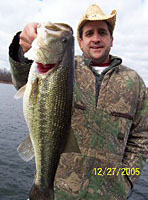 Let’s
tackle question #2 first. If you don't retain
anything but what I'm going to say next it will be well
worth your time. Falling water will affect different lakes
in various ways. Such as, if a lake is relatively shallow and
the fish are in the backs of the creeks when the water begins
to drop let's say 5 feet, most likely they will move
to the nearest secondary break or point. As the water continues
to drop another 5 feet the fish will move on to the next available
point or break and so on until the water stabilizes. But, on
a lake like Tim's which is a deep lake, the fish will
move much less in distance and their move will be more horizontal
than vertical. Bass on Tim's just have a lot more water
to work with. So let's say that this Saturday you get
on some Smallmouth on Tim's on gravel rounds 1/4 of
the way back in the creeks near 2 main river channel points
and the fish are holding in 15 feet of water. The Corp drops
the lake 5 feet by next Saturday. Where do you look for these
fish that you were on a week ago? Have the fish moved and you
look for them on the channel points 75 yards away or still
15 feet deep on the same gravel round? I always start at the
15 foot gravel round, Why? As I said the fish on Tim's
have a lot more water to work with. I've watched this
over the past several years. On a deep lake it will take more
factors than just falling water to push a Smallmouth into a
radical move.
Let’s
tackle question #2 first. If you don't retain
anything but what I'm going to say next it will be well
worth your time. Falling water will affect different lakes
in various ways. Such as, if a lake is relatively shallow and
the fish are in the backs of the creeks when the water begins
to drop let's say 5 feet, most likely they will move
to the nearest secondary break or point. As the water continues
to drop another 5 feet the fish will move on to the next available
point or break and so on until the water stabilizes. But, on
a lake like Tim's which is a deep lake, the fish will
move much less in distance and their move will be more horizontal
than vertical. Bass on Tim's just have a lot more water
to work with. So let's say that this Saturday you get
on some Smallmouth on Tim's on gravel rounds 1/4 of
the way back in the creeks near 2 main river channel points
and the fish are holding in 15 feet of water. The Corp drops
the lake 5 feet by next Saturday. Where do you look for these
fish that you were on a week ago? Have the fish moved and you
look for them on the channel points 75 yards away or still
15 feet deep on the same gravel round? I always start at the
15 foot gravel round, Why? As I said the fish on Tim's
have a lot more water to work with. I've watched this
over the past several years. On a deep lake it will take more
factors than just falling water to push a Smallmouth into a
radical move.
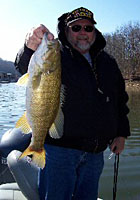 Comparatively the percentage of decrease in water depth of
5 foot to total volume on Tim's is very small compared
to the shallow lake. So always start on deep clear lakes where
you found the fish last time and "Then" work your
way out. Don't panic as the water falls on Tim's
or other deep water lakes. Historically it has been rare that
Smallmouth head for 50 feet of water just because of gradually
falling water. Normally they are going to stay fairly constant
at the same depths. Other factors might make them move but
not gradual falling water.
Comparatively the percentage of decrease in water depth of
5 foot to total volume on Tim's is very small compared
to the shallow lake. So always start on deep clear lakes where
you found the fish last time and "Then" work your
way out. Don't panic as the water falls on Tim's
or other deep water lakes. Historically it has been rare that
Smallmouth head for 50 feet of water just because of gradually
falling water. Normally they are going to stay fairly constant
at the same depths. Other factors might make them move but
not gradual falling water.
How Do
You Adjust To Falling Water Temperatures?. How hot
has it been on the lakes where you fish this summer? Here in
Tennessee we have had surface temperatures near 90 degrees
on most of our lakes. Temperatures all most like bath water.
When you talk about falling water temperatures this time of
the year you almost have to look at it in multiple stages.
Let me explain.
I've addressed this same question many times in various
articles over the past several years. I was brought up under
the teaching that there were "Magical Water Temperatures" that
would push bass into (a) spawn in the spring (b) fall patterns
(c) winter patterns. Truthfully I have found that not to be
so. I don't believe it's 70 degrees or 60 degrees,.
Rather I believe the INTIIAL FALL PATTERNS are kicked in when
the water temperatures makes a permanent 8 to 10 degree decline
in late summer/early fall and same is true in the Spring but
in reverse. So this year (ONLY AS A RULE OF THUMB) I would
consider 75 to 65 degrees early and mid fall. 65 to 55 late
fall early winter. Then 55 and below winter. Remember I said
I will use this as a rule of thumb on Tim's Ford this
year. It might be different on your lake but the formula should
be close.
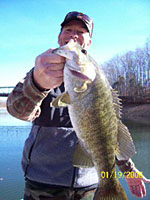 One way that you can visually see the beginnings of a fall
pattern is by watching bait fish. Usually as the water cools
the bait fish will move further back into the creeks and coves.
NOTE: This paragraph is for those of you that might fish a
lake with an over abundance of shad. As an example let's
look at Old Hickory in past year. Shad last year and two years
ago was so thick you could almost walk across the water on
them and not get your feet wet. They were every where, all
the time. River channels, coves, docks, creeks and pockets,
solid shad everywhere every day. If your lake is like that
it presents a little tougher situation and you have to rely
more on covering a lot of water and good use of your electronics
than just the presence of shad alone.
One way that you can visually see the beginnings of a fall
pattern is by watching bait fish. Usually as the water cools
the bait fish will move further back into the creeks and coves.
NOTE: This paragraph is for those of you that might fish a
lake with an over abundance of shad. As an example let's
look at Old Hickory in past year. Shad last year and two years
ago was so thick you could almost walk across the water on
them and not get your feet wet. They were every where, all
the time. River channels, coves, docks, creeks and pockets,
solid shad everywhere every day. If your lake is like that
it presents a little tougher situation and you have to rely
more on covering a lot of water and good use of your electronics
than just the presence of shad alone.
If we have a "Normal Fall" water temperatures
will slowly but steadily decrease. Water temperatures won't
fall from 85 degree to 50 degree over night. This slow decline
in temperatures gives bass time to adjust incrementally. Let
me explain it this way. I know this may be somewhat simplistic
but that's just the way I am. As I said in the opening
of this article it is 97 degrees in the shade, it's hot!
My body has adjusted to this heat, it's hot but I'm
use to it. Now let's just say for fun that I go to bed
tonight with the air conditioner left on 75 degrees like normal.
Over night the air temperature outside drops from the high
90's to 45 degrees or less. A 45 degree drop over night
and it's not getting any warmer during the day. What
a shock! I wake up and I swear I see ice cycles hanging off
our dresser mirror. I quickly by pass the shorts and tee shirt
I was going to wear and grab a pair of jeans, long sleeve tee
shirt and a sweatshirt. Man it's cold, what a immediate
shock to my system. I wasn't prepared for this. The temperature
is 45 degrees but my body is still operating at the 90 degree
level. See where I'm going with this? But what happen
if it takes 60 or 90 days for the air temperature to drop from
97 degrees to the same 45 degrees? The shock isn't as
great or maybe there's no shock at all. My body has time
to adjust to the declining air temperatures as I said above
incrementally. I've adjusted gradually.
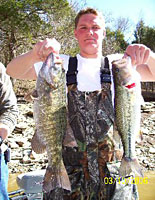 This is probably an over simplification but the same principle
applies to bass and their behavior relating to declining water
temperatures. If the water temperature dropped from 85 degrees
to 50 degrees overnight the bass would be running for cover
like me running for heavier clothes. They would have lock jaw
for how long? How Long? If your answer is until their bodies
have had time to adjust you would be very close to being right.
I can see the bass now, all huddled up under one big log, trying
to get warm and looking at one another, not moving a fin and
saying I'm not going out there!. But when the temperatures
drop gradually from 85 to 50 the bass adjust to it gradually
as well. The falling temperatures begin to nudge them into
their fall /winter way of thinking and reacting. Then it's
up to us to adjust gradually in the way we approach our fall
and winter game plans. Don't get ahead or behind yourself
study the deep lake your on and be vigilant of everything that's
happening around you.
This is probably an over simplification but the same principle
applies to bass and their behavior relating to declining water
temperatures. If the water temperature dropped from 85 degrees
to 50 degrees overnight the bass would be running for cover
like me running for heavier clothes. They would have lock jaw
for how long? How Long? If your answer is until their bodies
have had time to adjust you would be very close to being right.
I can see the bass now, all huddled up under one big log, trying
to get warm and looking at one another, not moving a fin and
saying I'm not going out there!. But when the temperatures
drop gradually from 85 to 50 the bass adjust to it gradually
as well. The falling temperatures begin to nudge them into
their fall /winter way of thinking and reacting. Then it's
up to us to adjust gradually in the way we approach our fall
and winter game plans. Don't get ahead or behind yourself
study the deep lake your on and be vigilant of everything that's
happening around you.
What
kind of tackle adjustments do you make?: As we move into
the Fall and Winter you might be making the same type of move
to a deep clear lake like me, there are several factors that
I believe can make the difference between experiencing a good
season or a so so season. Let's look together.
Line: First of all let me say that I tend to be a "Light
Line" fisherman most of the time no matter where I fish.
So line adjustment which to me is so important especially on
a deep clearer lake I already have in place. Over the years
I have fished with 100's and 100's of people. Many
of them in our pre-trip conversations will express their desire
to use their own equipment. No problem-truthfully if I fished
with a guide on another lake I would most likely want to us
my own equipment as well. When we get to the subject of line
size and I tell them that I use 6 pound test blue florescent
for most techniques (occasionally 4 pound test) and when I'm
throwing heavy spinner baits or some 20 plus crank baits I
use 8 or 10 pound max there is a noticeable silence on the
other end. Most of the time they will tell me that they have
15 or 17 pound test on and they aren't really comfortable
with anything lighter. Not fully understanding how important
light line is they come the day of the trip with heavy line.
But it isn't long before their asking to use one of my
rods because they can see the difference in the amount of hits
I'm getting verses them using the exact same baits. Light
line just makes that much difference. And when you combine
the small diameter of light line with the visibility of blue
florescent it gives you the ability to see the smallest of
hit's no matter what lure you are using. With florescent
line you can see the bait move slightly off to the side, you
can see the small quiver or tick in the line as the bait is
falling. I would just as soon stay home than have to fish Tim's
with heavy line for Smallmouth.
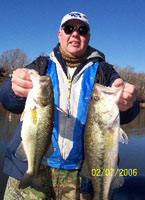 The question always comes up when you are talking about light
line, What About Breaking Fish Off? Well, I guess I would have
to answer that this way. That's what your drag on you
reel is for. If you fish light line with your drag winched
down tight I think you will be in big time trouble. But on
the other hand if you are using the correct action rod (which
we address next) and a reel with good line that has the drag
set properly, and retying when you should, you will break off
very few fish.
The question always comes up when you are talking about light
line, What About Breaking Fish Off? Well, I guess I would have
to answer that this way. That's what your drag on you
reel is for. If you fish light line with your drag winched
down tight I think you will be in big time trouble. But on
the other hand if you are using the correct action rod (which
we address next) and a reel with good line that has the drag
set properly, and retying when you should, you will break off
very few fish.
Rods: This is going to be an easy on for me. There is only
one brand of rod that I use and that is All Pro rods. www.allprorods.com Roger Ray owner and V.P. Billy Campbell absolutely build one
of the finest rods that you can ever have in your hands. It's
difficult for some folks to put down their pool cue rods and
opt for different tackle. I can assure you as a full time guide
making changes like this will increase you catch ratio drastically.
I use basically 3 different All Pro Rods on Tim's Ford.
These are the length and action that work best for me.
All Pro
APX7MST 7 Foot Medium Action: Lure weight on this
rods is 1/4 to 5/8 ounce with a recommended line weights of
6 to 12 pound test. These rods are 100% American made by American
Rod Builders. All APX rods are built with the blank running
through the Fuji reel seat and handle which give you unmatched
sensitivity. On the handle itself there are also graphite sensor
rings that transmits additional sensitivity from the rod into
your hands. From the instant you pick up one of these high
quality rods you will be amazed at how light it is but how
sensitive and powerful it is. Finished off with Gudebrod thread
wrap and polished titanium guides that provides smooth cast
and greater distance with lighter baits (which is ultra important
on clear lakes) this rod is unbelievable. People laugh when
I say I can feel the turbulence from a Smallmouths tail when
he swims by...a little stretch but not by much. I use
this rod for all my crank baits up to 15 plus type baits, hard
body and soft plastic jerk baits, most top water, some soft
plastics and light to mid range spinner baits and buzz baits.
All I can say is wow!
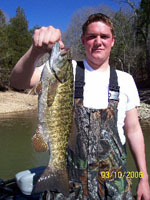 All
Pro AtlAntis Series AT76MLS 7' 6" Medium Light
Action: Lure weight on this rod is 1/16 to1/2 ounce.
Recommended line weight is 4-8 pound test. When I didn't think
Roger and Billy could come up with something else as fantastic
as the APX they introduced the AtlAntis series rods. Roger
was approached by inshore saltwater guides to build a rod for
redfish, speckled trout, tarpon and snook. The All Pro team
went to work and over the course of many months of R&D
these rods were developed. When the first proto types arrived
at the office I couldn't wait to get my hands on one. Immediately
when I held one my mind raced to small crank baits, mini hair
jigs, finesse shaky head worms, whirly bee's, small/light top
water baits, live bait and more. The 7'6" length
enables you to get extra long casts with extremely light baits.
The same 100% American made construction but built extra tough
for salt water use but yet light as a feather. I have used
these rods since the Fall of 2005 and I can tell you from personal
experience that the construction and length of these rods will
absolutely wear a fish down at the boat. Light weight construction,
unbelievable sensitivity (let me say that again) unbelievable
sensitivity and power when you need it.
All
Pro AtlAntis Series AT76MLS 7' 6" Medium Light
Action: Lure weight on this rod is 1/16 to1/2 ounce.
Recommended line weight is 4-8 pound test. When I didn't think
Roger and Billy could come up with something else as fantastic
as the APX they introduced the AtlAntis series rods. Roger
was approached by inshore saltwater guides to build a rod for
redfish, speckled trout, tarpon and snook. The All Pro team
went to work and over the course of many months of R&D
these rods were developed. When the first proto types arrived
at the office I couldn't wait to get my hands on one. Immediately
when I held one my mind raced to small crank baits, mini hair
jigs, finesse shaky head worms, whirly bee's, small/light top
water baits, live bait and more. The 7'6" length
enables you to get extra long casts with extremely light baits.
The same 100% American made construction but built extra tough
for salt water use but yet light as a feather. I have used
these rods since the Fall of 2005 and I can tell you from personal
experience that the construction and length of these rods will
absolutely wear a fish down at the boat. Light weight construction,
unbelievable sensitivity (let me say that again) unbelievable
sensitivity and power when you need it.
All pro
APX Series APXCS7MHCA Medium Heavy Action: Lure weights
on this rod is 1/4 to 3/4 ounce. Recommended line weight is
8 to 17 pound test. This is the rod I use for all my larger/heavier
baits. I particularly like the tip action on this rod and you
can feel every thump of a spinner bait blade and every wiggle
of a crank bait. I spool my bait casters with 8 or 10 pound
test max. This rod is ultra sensitive, strong, rugged and responsive
to hook sets. These are the 3 rods that I use day in day out
on Tim's Ford. I can't explain enough how important
rod sensitivity is. Many times it's just a different
feel. Something that's just not normal when a Smallmouth
inhales a small bait. If you are sitting there with the wrong
equipment you have greatly limited your success before you
even get to the ramp. Now let's tackle the last point.
Lure or bait presentation.
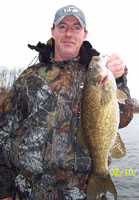 What
adjustments do you make in presentation? Most people
that are use to fishing lakes that are more on the shallow
side tend to sit out away from the bank and cast in. This type
of presentation works well in that setting. But when you are
fishing a lake where the banks drop of quickly, you are much
better off to parallel the banks. This is very easy to do with
no more than one or two people in the boat, almost impossible
with three.
What
adjustments do you make in presentation? Most people
that are use to fishing lakes that are more on the shallow
side tend to sit out away from the bank and cast in. This type
of presentation works well in that setting. But when you are
fishing a lake where the banks drop of quickly, you are much
better off to parallel the banks. This is very easy to do with
no more than one or two people in the boat, almost impossible
with three.
Here is the way I approach an area that I intend to fish.
First I shut my motor down a considerable distance away from
the area I want to fish. I always use just enough trolling
motor speed to do the job. My first thought is not to make
any more noise than I have to. If the wind is blowing into
the bank I'm going to fish (hopefully it is) I stay off
the bank far enough to keep the boat from banging into the
rocks but still parallel with the bank. If there isn't
a wind I position my boat to where you can almost step out
on the bank. The whole idea is to keep the bait that you are
using in the "Strike Zone" as much as possible.
If you are throwing crank baits you will want to beat and bang
off everything possible on your retrieve back to the boat.
The same is true with spinner baits. When I come to a point
or just before the center of a round I swing my boat out away
from the bank so we can make repeated casts across the face
of the point. If I elect to fish the backside of the point
I immediately reposition my boat back again. I have also found
that when fishing non-weed less hair jigs and live bait it's
better for me to sit out and cast in to keep from being hung
as much. Saves a little aggravation.
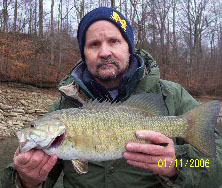 Most of the fish we catch late fall and winter on Tim’s
Ford will be in 15 feet of water or less. That's not
to say that there isn't suspended fish that can be caught
in deeper water with a spoon or drop shot rig. But by in large
if you will position your boat against the bank as close as
possible you will find your catch ratio will go up dramatically.
Most of the fish we catch late fall and winter on Tim’s
Ford will be in 15 feet of water or less. That's not
to say that there isn't suspended fish that can be caught
in deeper water with a spoon or drop shot rig. But by in large
if you will position your boat against the bank as close as
possible you will find your catch ratio will go up dramatically.
Conclusion
Yes change is just around the corner and you can be there
enjoying every bit of it. I hope that I have given you some
things to think about. Every ounce of content in this article
works for me day in and day out as a full time guide. Remember
all of these up coming events depend on decreasing water temperatures.
Be aware each day you are on the water of the changes that
have taken place. Sit down at home before you get to the lake
and lay out a tentative plan of action and then adjust as need
on the lake. If I can help you or answer any questions feel
free to e-mail me at rickm@dtccom.net or through my web site
at www.tennesseebassguides.com Office telephone number is (615)
765-7303. Thank you for reading this article...I hope
you have a great fall and winter season.
Rick McFerrin
Owner/Full Time
Guide
Tennessee Bass Guides LLC
www.tennesseebassguides.com
More Tips Tennesse Guide Service

